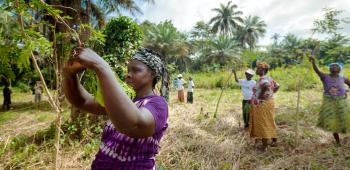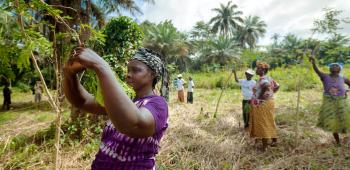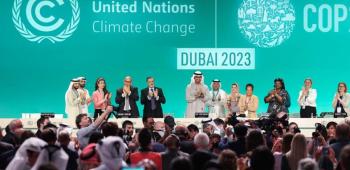Climate Action and Synergies
Description
The science is clear: our climate is heating rapidly. The average global temperatures have increased by 1.2 degrees Celsius since 1880, particularly in the late 20th century. The concentration of atmospheric CO2, the GHG that contributes more than 2/3 to global warming, is at its highest level ever. The Intergovernmental Panel on Climate Change (IPCC) steadily points out that human activities have warmed the atmosphere, ocean and land, producing widespread and rapid changes in the atmosphere, ocean, cryosphere and biosphere. Due to these changes in climate, the number of weather, climate and water-related disasters has increased by a factor of five over the past 50 years, causing over 2 million deaths and US$3.64 trillion in losses.
According to IPCC, warming beyond 1.5 degrees could have irreversible and irreparable consequences. However, effective and equitable adaptation and mitigation actions can significantly reduce vulnerability and contribute to climate resilience. To limit global warming to well below 2, preferably 1.5 degrees Celsius, compared to pre-industrial levels, countries came together to hold themselves accountable under the Paris Agreement. The agreement is a milestone of international cooperation to tackle climate change – first legally binding document in the history of climate action.
To move fast in the race against climate crisis, targeted actions that bring tangible benefits and limit the trade-offs on multiple fronts, are key for common success against climate change. The 2030 Agenda and the Sustainable Development Goals (SDGs), the world’s plan of action to achieving sustainability and resilience for people and planet, are closely linked with climate. Maximizing on the interlinkages between the 2030 Agenda and the Paris Agreement by leveraging Climate and SDG Synergies, has the potential of achieving both agendas and guaranteeing a livable future for next generations by leaving no one behind. In fact, progress made towards limiting global temperature increase would significantly ease the path to many other SDGs, such as those related to poverty, hunger, access to water, and terrestrial and marine ecosystems. Many of the SDGs and their targets can also be achieved in ways that would enable adaptive responses to climate change, for example those related to resilience in SDGs 9 and 11, respectively relating to infrastructure and urban settlements.
UN DESA is moving the needle forward for harnessing synergies across development and climate action. Through its support to various intergovernmental processes and fora, UN DESA is working to improve coordination with other entities by using the 2030 Agenda as both a framework and guiding principles.
CLIMATE ACTION STARTING NOW

Everyone has a role in climate action. At the United Nations, we are calling on people everywhere to work together to solve climate challenges and realize the commitments of the 2015 Paris Agreement. Learn more on UN Climate Action, including Secretary-General’s key statements on climate change, Climate Fast Facts, ActNow - the United Nations campaign for individual action, and much more.
Pagination
| Title | Category | Date |
|---|---|---|
| Thailand | Waste Management and Chemicals | 12-May-2011 |
| Mr. Sha Zukang | Ministerial Roundtable | 14-May-2008 |
| China | Ministerial Roundtable | 14-May-2008 |
| Montenegro | Ministerial Roundtable | 14-May-2008 |
| Switzerland | Ministerial Roundtable | 14-May-2008 |
| United States of America | Ministerial Roundtable | 14-May-2008 |
| Australia | Climate Change | 1-May-2007 |
| Brazil | Climate Change | 1-May-2007 |
| European Union | Climate Change | 1-May-2007 |
| Group of 77 & China | Climate Change | 1-May-2007 |
| Ghana | Climate Change | 1-May-2007 |
| Guatemala | Climate Change | 1-May-2007 |
| Iran | Climate Change | 1-May-2007 |
| Jamaica | Climate Change | 1-May-2007 |
| Japan | Climate Change | 1-May-2007 |
Pagination
Milestones
-
September 2023 UNFCCC Regional Climate Weeks 2023Throughout the series of Regional Climate Weeks, stakeholders, government officials, experts and activists convene to explore resilience against climate risks, the transition to a low-emission economy and collaboration to solve pressing challenges. Working together on these topics opens opportunity to address social inequalities and invest in development that is good for humanity and nature. Four Regional Climate Weeks will be held this year to build momentum ahead of the UN Climate Change Conference COP28 in Dubai and the conclusion of the first Global Stocktake, designed to chart the way for fulfilling the Paris Agreement's key goals. The following Regional Climate Weeks are confirmed for 2023: Africa Climate Week (ACW 2023), Nairobi, 4-8 September, hosted by the government of Kenya Middle East and North Africa Climate Week (MENACW 2023), Riyadh, 9-12 October, hosted by the government of Saudi Arabia. Latin America and Caribbean Climate Week (LACCW 2023), Panama City, 23-27 October, hosted by the government of Panama. Asia-Pacific Climate Week (APCW 2023) will also take place in the second half of 2023.
-
November 2022 Sharm El-Sheikh Climate Change Conf.The 2022 UN Climate Change Conference (COP27), hosted by Egypt, presented as the outcome document its Implementation Plan. The Plan highlights that a global transformation to a low-carbon economy is expected to require investments of at least USD 4-6 trillion a year. Countries decided on a breakthrough agreement to provide “loss and damage” funding for vulnerable countries hit hardest by climate disasters. Additionally, governments agreed on the way to move forward on the Global Goal on Adaptation, which will conclude at COP28 and inform the first Global Stocktake. New pledges, totaling more than USD 230 million, were made to the Adaptation Fund. The plan “requests” countries that have not yet done so to “revisit and strengthen” their 2030 climate targets by the end of 2023, “as necessary to align with the Paris Agreement”. The plan has been citified for not advancing ambition on 1.5ºC and growing calls for all fossil fuels phaseout.
-
Building on the outcomes of the first Climate and SDGs Synergy Conference in 2019 and the virtual consultations in 2020/2021, the joint UNDESA and UNFCCC Third Global Conference on Climate and SDGs Synergies, hosted by the Ministry of the Environment of Japan, in partnership with the United Nations University (UNU) and the Institute for Global Environmental Strategies (IGES), provided a unique opportunity to take stock of practical measures that are being implemented to advance climate and SDG synergies in regional, national and subnational efforts, including through COVID recovery plans and the NDCs. At the high-level segment of the Conference, Ministers, heads of UN organizations and agencies, business leaders, scientists and youth representatives emphasized the need for greater SDG and climate ambition. The need to urgently boost joint implementation and address gaps such as financing and capacity building was also recognized.
-
January 2022 IPCC 6th Assessment ReportThe 6th IPCC Assessment on Climate Change provides the most updated understanding of climate change based on five scenarios, all showing that global warming is set to reach or exceed 1.5ºC in the coming decades. It shows that human-induced climate change is already affecting many weather and climate extremes in every region across the globe. Moreover, evidence of observed changes in extremes such as heatwaves, heavy precipitation, droughts, and tropical cyclones, and, in particular, their attribution to human influence, has strengthened since AR5. The Report highlighted that accelerated and equitable climate action in mitigating and adapting to climate change impacts is critical to sustainable development. Enhanced mitigation and broader action to shift development pathways towards sustainability will have distributional consequences within and between countries. Attention to equity and broad and meaningful participation of all relevant actors in decision-making at all scales can build social trust, and deepen and widen support for transformative changes.
-
November 2021 Glasgow Climate Change Conf.The COP26 UN Climate Change Conference, hosted by the UK in partnership with Italy, concluded with the adoption of the Glasgow Climate Pact. The main objective of the British Presidency of COP26 was to “keep hope alive” for a 1.5 degrees trajectory. Assessments vary widely as to whether the pledges achieved that or not. One of the hardest-fought result at Glasgow was the first-ever explicit reference to fossil fuels, with “phase-down” coal-fired power generation and “phase-out” of fossil fuel subsidies. Moreover, negotiators closed a deal setting rules for carbon markets to implement Article 6 of the 2015 Paris Agreement. The Pact emphasizes the need to mobilize climate finance “from all sources to reach the level needed to achieve the goals of the Paris Agreement, including significantly increasing support for developing country Parties, beyond $100 billion per year”. It included the agreement to double the proportion of climate finance going to adaptation, but made little progress towards a further step of some form of funding mechanism for loss and damage.
-
In May and June 2020, the UN DESA and UNFCCC Secretariats organized a series of three virtual engagement webinars in preparation for the upcoming High-level Political Forum (HLPF) on Sustainable Development. The objectives were to take stock of advances in knowledge and practices in implementing synergies, and to explore how to maximize SDG and climate co-benefits, particularly in the context of COVID-19 recovery measures. Between December 2020 and February 2021, a second series of three additional virtual learning webinars was organized on the theme of ‘Harnessing Climate and SDGs Synergies’. The main objective was to compile materials for information sharing and self-training options for interested climate and SDGs policy makers. At the conclusion, UN DESA, UNFCCC and the United Nations Institute for Training and Research (UNITAR) launched an e-learning course on the theme of ‘Harnessing Climate and SDGs Synergies’.
-
December 2019 Madrid Climate Change Conf.The 25th UN Climate Change Conference (COP25/CMA2/CMP15), held in Madrid and presided over by the Chilean Government, sought to close negotiations around Article 6 of the Paris Agreement. Although discussed extensively, negotiators could not reach consensus on modalities 6.2 and 6.4 of the agreement, regulating ITMOs and carbon market mechanisms and the transfer process of carbon credits from the Kyoto Protocol, respectively. Parties decided to relaunch Warsaw International Mechanism to account for loss and damage due to climate change, but financing was not strictly required from developed states. To provide logistical support on the matter, parties established the Santiago Network. Inclusion of marginalized voices was highlighted, such as those of youth and Indigenous people, as well as the introduction of the 5-year Gender Action Plan (GAP) to seek gender-responsive climate action. As heavily encouraged in previous COPs, parties discussed the need for extended financing and ambition towards climate change, including monitoring of these goals and processes.
-
The Global Conference on Strengthening Synergies between the Paris Agreement and the 2030 Agenda for Sustainable Development (informally the Climate & SDGs Synergy Conference), organized by UN DESA and the UN Framework Convention on Climate Change, and hosted by the Ministry of Foreign Affairs and the Ministry of Energy, Utilities and Climate, Denmark, aimed to align the climate and SDG processes, and stimulate action from stakeholders at the global, regional and country levels to maximize co-benefits. Limiting global warming to 1.5 degree C above pre-industrial levels, including through scaling up climate action towards both adaptation and mitigation, is an imperative critical to the achievement of the 2030 Agenda. The conference examined how best to advance joined-up efforts for both the SDGs and climate action at the global, regional and country levels, thus also helping to scale up levels of ambition towards these objectives.
-
December 2018 Katowice Climate Change Conf.At the third COP held in Poland, annual negotiations continued in December 2018, as UN Sec Gen Antonio Guterres said “more action and more ambition” was necessary. This conference solidified the “rulebook” on the Paris Agreement, known as the Katowice Climate Package, structuring each signatory’s NDCs, creating a system of transparent dialogue and accountability, and creating a committee to review performance regarding NDCs, as informed by global stock-taking exercises. Progress monitoring of parties’ emissions, pledges, and ambitions will continue and will be reviewed and enhanced before 2020. Some conclusions failed to come about; rules on mechanisms to employ ITMOs were not agreed upon and parties did not unanimously agree to incorporate guidelines from the UN IPCC Special Report, which reports the danger of global temperature rise of 1.5°C within the century. Discussion was also brought up about displacement caused by climate change, including how occurrences such as extreme weather events displace four times as many people as conflict. Parties delivered recommendations to create contingency plans, analyze data, and cooperate with other states to handle displacement situations.
-
November 2017 Bonn Climate Change Conf.The 2017 UN Climate Change Conference (COP23/CMA1-2/CMP13) hosted in Bonn, Germany and presided over by the Government of Fiji, called again for further action to combat climate change, especially regarding land emissions and accelerating ambition on the Paris Agreement. The Conference created the Talanoa dialogue, allowing countries to transparently discuss climate goals with non-state actors, which is expected to help parties reach those goals. Although further financial contributions were made, concerns remain that predictable finance and climate contributions will slow, hindering the gaining momentum made by developing countries. Additionally, emphasis is needed on representing marginalized voices. COP23 saw the ratification of the Paris Agreement from 170 parties and decided on the Koronivia Joint Work on Agriculture, addressing concretely for the first time the impact of climate change on agriculture and forestation, as well as food security. Continued monitoring of pre-2020 implementation is essential to accomplishing the goals set out in the Paris Agreement and the 2030 Agenda.
Pagination
- Page 1
- Next page
WHAT WE DO
UN DESA is moving the needle forward for harnessing synergies across development and climate action. Through its support to various intergovernmental processes and fora, UN DESA is working to improve coordination with other entities by using the 2030 Agenda as both a framework and guiding principles.
Harnessing Climate and SDGs Synergies
|
|
Synergies between SDGs and climate can be found across all 17 goals. Broader themes such as energy, water, and agriculture are particularly promising for co-benefits and are highly interlinked at the SDG level.
UN DESA is working to support the interlinked SDG and climate frameworks through the Harnessing Climate and SDG Synergies platform, created with the UN Framework Convention on Climate Change (UNFCCC), thus producing related learning series, and analytical reports. In this context, the annual SDG Pavilion at COP brings together partners and contributes to the discussions for synergistic action on climate and SDGs.
Accelerating Universal Energy Access and Net-zero Emissions
|
|
Currently, 75 per cent of all greenhouse gas emissions stem from the energy sector, making it one of the main drivers of climate change.
UN DESA served as secretariat for the High-level Dialogue on Energy in 2021, supporting the preparatory process. As the Secretariat of UN Energy, UN DESA also supported the development of a new strategic focus, including a pledge to assist countries in their efforts on the following objectives by 2025. UN-Energy facilitated the development of a series of ‘Energy Compacts.’
Promoting Water for Sustainable Development
|
|
Climate change is primarily a water crisis. By 2050, the number of people at risk of floods will increase from its current level of 1.2 billion to 1.6 billion.
UN DESA supports the implementation of the “International Decade (2018-2028) for Action – Water for Sustainable Development” and related UN Water Conference on the midterm review which will take place 22-24 March 2023 in New York. UN DESA also supports interagency coordination on water and sanitation by designating the UN-Water Secretary and providing policy advise.
Protecting our Oceans
|
|
Marine and coastal ecosystems provide protection from natural disasters. Oceans provide oxygen and regulate the global climate, acting as a giant sink for GHGs.
UN DESA coordinates and collaborates with the Communities of Ocean Action and the UN Secretary-General's Special Envoy for the Ocean. UN DESA has also been supporting the Governments of Kenya and Portugal to organize the second UN Ocean Conference, held from 27 June to 1 July 2022, and its preparatory meetings.
Protecting our Forests
|
|
Forests help stabilise the climate. They regulate ecosystems, protect biodiversity, play an integral part in the carbon cycle, support livelihoods, and can help drive sustainable growth.
UN DESA provides support to the United Nations Forum on Forests, and its work directly supports the implementation of the UN Strategic Plan for Forests 2030 and the UN Forest Instrument and is guided by the 2030 Agenda for Sustainable Development and other relevant global agreements.
To receive updates on the various initiatives under Climate Action and Synergies, please register for the regular newsletter updates or visit the relative news section of the website.
Climate and SDGs Synergies Newsletter: 
UN Energy Newsletter: 
UN Water News: 
Ocean Action Newsletter: 
UN Forum on Forests News: 




